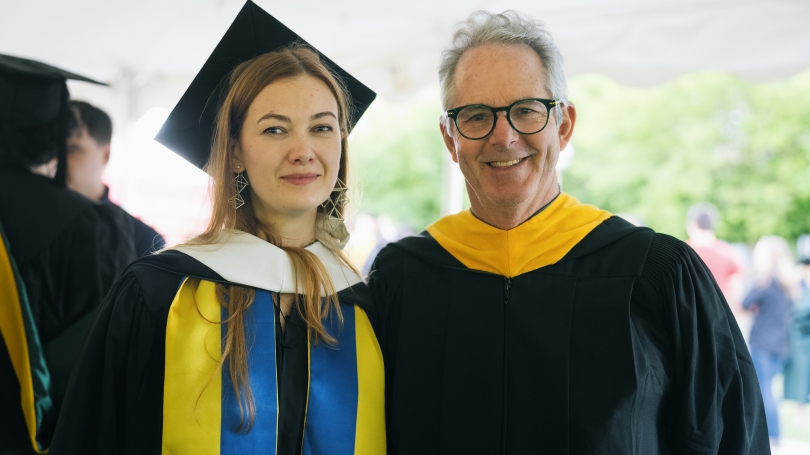What do you consider your hometown?
I am from Odesa, Ukraine - a multicultural city near the Black Sea. It is truly a beautiful place, with a rich history and a blend of Baroque, Renaissance, and Art Nouveau architecture. I really hope we will be able to preserve all the cultural heritage despite the Russian invasion.
Where did you earn your undergraduate degree and what was it in?
I hold my first MS in Chemical Technology Engineering, which I obtained at Odesa National Polytechnic University. I love that my background is in natural science. It allows me to bridge between technologies and humanities.
Tell us about your thesis.
In my thesis, I analyze two sustainability strategies in agriculture from three perspectives: cultural, environmental, and business. I compare precision agriculture (that relies on robotics, AI, and gene engineering) with agroecology (that combines traditional ecological knowledge with scientific research, collaborating with indigenous communities). My work focused on how to enable a meaningful dialogue between cultures and cultivate environments that promote the "dialogue of knowledge systems" and making ethical decisions in business. I also discuss how technologies such as AI can be developed in a way to enhance and generate new human capabilities, instead of taking them away.
What inspired you to pursue this research?
This thesis is my attempt to educate myself to work with complex systems. The reality of the world is complex and multi-layered. Social, economic, environmental, and political factors are deeply interwoven. As a designer, I always wanted my work to be meaningful and impactful, and for that, I wanted to learn how a system's constituent parts interrelate, and how they work over time. Finding solutions requires making sense of this complexity.
What does it mean to you to receive the award?
I assume it means that my arguments were convincing, which tells me there is an opportunity for change. Now it's time to put theory to practice.
Why did you choose Dartmouth for your degree?
I appreciated the MALS program's flexibility, which allowed me to create a personalized study plan and select courses tailored to my specific research interests. As a chemist and a designer, I had a non-standard background and the format of the program allowed me to work on things that I wanted to delve deeper into. I also had access to courses outside of my track and was able to audit courses at Thayer School and Tuck School of Business.
What are your post-graduation plans?
As a creative person, I have lots of project ideas that I want to bring to life. This is a feature of all creative people; they cannot sit idle. As seen from my thesis, I am interested in the practical implementation of complex problem-solving, and I see design as a tool. So after building a better theoretical understanding of socio-economic and political processes I would love to take this knowledge and check how it works in practice. Also, another topic I am interested in is addressing polarization and propaganda effects in society. I believe that due to the current political situation in the world, this problem is becoming more serious and widespread across the globe. I am curious about how to apply creativity here.
What do you like best about Dartmouth?
I am very lucky to be surrounded by absolutely amazing kind and caring people. This is something I am most grateful for.
